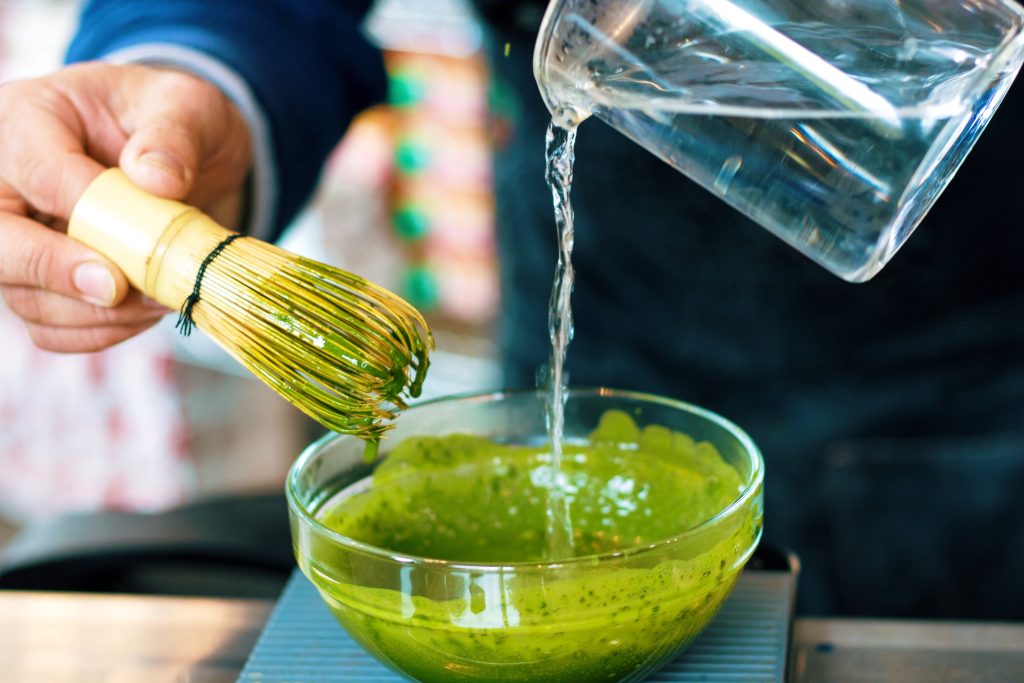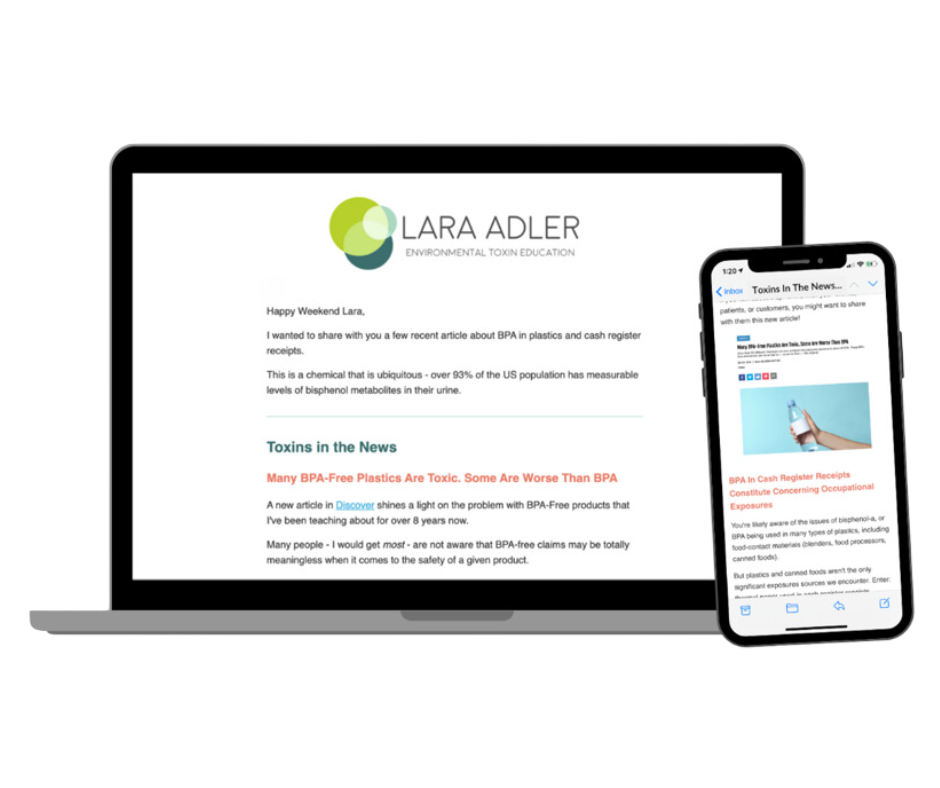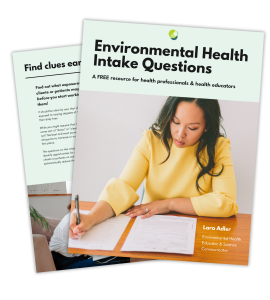Matcha Tea Is Trendy… But Can It Help You Detox?
As trends go, matcha tea is having a huge moment in the spotlight at the moment. Search Instagram for #matcha and you’ll find over 3 million decidedly delicious hits, with images of far more than just tea. Much of the buzz around matcha tea is it’s ability to help us to detox.

As a health coach, nutritionist, or other allied health professional who follows trends in nutrition, you’re likely seeing more and more of information about matcha tea and it’s purported detox benefits in your feeds. While it’s certainly trendy, is there true merit behind the detox claims?
In short, yes! But let’s back up a minute.
While matcha tea is the “it” health beverage of the moment, it certainly isn’t new; the history of this rich and velvety drink goes back to the Tang Dynasty in China, which ruled between the 7th – 10th centuries. Over time, the matcha tea made its way to Japan, where it began to be incorporated into special tea ceremonies.
Zen Buddhist monks of the time found that drinking matcha tea helped them to become more centered and focused during meditation. (I drink matcha tea each morning for this same reason!)
So why is so popular now?
Because health is hip! And health is hip in large part because more and more people are dealing with chronic health issues than ever before. Awareness and acceptance of more holistic approaches to wellness have turned once “hippie” foods like hemp and chia seeds into staple kitchen items for millions of people who are on a healing journey.
This trend towards health has pulled this once obscure tea into the mainstream in a big way, and I couldn’t be happier!
A World of Toxic Exposure
It’s hard to ignore or dismiss that rates of chronic health issues like autoimmune diseases, diabetes, obesity, heart disease and cancers are increasing. Scientists are indicating that rates of these diseases and other chronic health issues are increasing at rates that are faster than can be explained by changes in genetics.
A big part of this uptick in poor health is due to the thousands of chemicals we’re exposed to every single day: plastics in our food containers, flame retardants in our furniture, hormone altering chemicals in our shampoo, deodorant and make up…
The bottom line is that our bodies are toxic.
Addressing toxic exposures with your clients and patients is now a non-negotiable if you want them to experience lasting and meaningful improvements in their health. While the goal is to help your clients or patience (or yourself!) to start reducing our exposure to as many of these harmful, toxic chemicals as possible, we all need a little extra help.
The truth is that no matter how hard we try, we simply can’t avoid all toxins, all the time. There will always be some ongoing exposures that we can’t do anything about. And we can’t forget that we have a lifetime of exposures already built up inside each and every one of us, started from before we were born.
As a health coach, nutritionist, chiropractor, or other type of allied health practitioner, you’re always looking for more tools to add to your toolbox that will help you to better help those you serve.
When it comes to detoxing, thankfully, some of the “tools” out there are enjoyable and relaxing (hello sauna!); matcha tea is both of those things and it’s delicious too!
Matcha tea can be an ally on our quest to detox our bodies from many of the toxins we’re exposed to.
Don’t Our Bodies Already Detox On Their Own?
Ever heard this? As a health coach, I hear this all the time!
“You don’t need to detox: your body does this on it’s own every single day!”
Yes, our bodies do have built-in processes to detoxify naturally, six of them to be exact!
Your liver is the workhorse of the detox process, tasked with breaking down both endogenous (from inside our bodies) and exogenous (from outside our bodies) toxins and helping them to safely exit the body. (1)
Your kidneys help flush water soluble waste out via your pee, your colon escorts toxins and waste matter out every time you poop, and even your sweat can help release toxins stored in body fat.
But the problem is we are all exposed to more toxins than our detox systems can handle, and we’re taking in toxins faster than we’re able to get rid of them. Essentially, our buckets are overflowing, and the result is chronic health issues.
The best ways to arm yourself against the negative effects of exposure to toxic chemicals found in consumer products, food, and even drinking water is to:
- Reduce exposures wherever possible
- Support your body’s natural detox pathways
One of my favorite ways to strengthen my body’s natural detox abilities is to drink matcha tea.
The Magic of Matcha Tea
Matcha is not your regular kind of tea. Nearly all tea is steeped: you toss a tea bag or some loose leaves into a pot and let it sit for a few moments. Then you strain out and discard the leaves, throwing some of the best parts out in the trash.
Unlike loose leaf tea, matcha tea is a superfine powder made only from steamed, dried and ground leaves. When you drink it, you’re consuming the whole leaf.

Two weeks before harvesting the leaves, the tea plants are shaded, which jacks up their chlorophyll levels, and those chlorophyll levels are one of the reasons matcha is so magical. Chlorophyll can help improve liver function, which can help increase your body’s ability to flush out toxins. Chlorophyll has also been shown to help with the excretion of heavy metals, dioxins, and other persistent chemicals, like PBC’s.(2, 3)
Matcha tea is easily the most delicious and enjoyable way to boost our detox abilities, every single day.
Matcha Tea Does So Much More Than Aid Detox
The detox factor alone is enough reason for me to start every day with a cup of matcha tea. But, there are so many other reasons to love this stuff, and to encourage all your clients or patients to give it a try:
- Protection against free-radicals. You’ve heard about the antioxidant power of green tea, right? Well, matcha has 137 times more antioxidants than regular green tea! And 20 times more than a serving of blueberries. Antioxidants are key to disease prevention, and are one of the best ways to boost your health. (4)
- Cancer prevention. Catechins, which are potent cancer-fighters counteracting the effect of pollutants, chemicals, UV rays, and radiation, are a unique set of antioxidants found only in matcha. According to the National Cancer Institute, green tea is one of the most powerful cancer-fighters. (5)
- Calm alertness. Matcha tea is rich in the amino acid L-Theanine, which is what left those Zen monks (and me) feeling calm, yet alert and focused. While it is a component of all green and black teas, matcha contains roughly five times the amount of L-theanine. Linked to increased concentration, learning ability and even physical endurance, L-Theanine gives you a boost without the caffeine jitters. (6) As someone who absolutely cannot handle the caffeine in coffee, matcha is my go to pick-me-up. If your clients or patients struggle with caffeine jitters, a cup of matcha might be a better choice.
- Anti-aging properties. A common drink in Okinawa, Japan, one of the few Blue Zones, where people live the longest, healthiest lives, matcha is said to reduce inflammation and oxidation, contributing to anti-aging.
- Fat-burning properties. One study found that matcha tea increased thermogenesis, the body’s rate of burning calories, by about 4 times the normal rate. Another study showed that drinking matcha before exercise resulting in 25% more fat burning. (7, 8)
- Improving heart health. Green tea has been shown to lower LDL cholesterol, and lower incidence of heart disease and stroke in regular drinkers. (9) A recent Chinese study found that hypertension risk is lowered by up to 65 percent in regular green tea drinkers. Imagine the potential improvements to heart health in drinkers of the much more concentrated form of green tea that matcha is!
Does Matcha Tea Make You Poop More?
More than coffee? It depends. Not all matcha is created equal, as discussed in this article, but yes, it’s possible that matcha can make you poop more due to higher antioxidant content and also due to caffeine. So if you are concerned at all about this, you might want to limit your matcha intake if you suspect it to be the cause of undesirable effects.
Buying Matcha Tea
You can purchase matcha tea online or at your local health food store, but, it’s important to be aware that not all matcha tea is the same. Matcha tea powders are often sold as a mix, with additional ingredients like sugar and milk powders. Be sure to read the ingredients and make sure there is only one thing listed: matcha. Be especially careful when ordering matcha at a coffee shop, as these are often made from these mixes.
Matcha should always come in an airtight, light-proof container, as this helps seal in freshness and prevent oxidation. Look for matcha powders that are bright green.

Opt for organic matcha whenever possible. If you want to drink your matcha tea in the more traditional style, you’ll want to get some ceremonial-grade powder tea (more to come on that). You can use culinary-grade for lattes or adding to smoothies or recipes.
My favorite brands are Encha, DoMatcha, and Pique Tea. Both of these companies offer USDA certified organic matcha tea, and both companies also test for heavy metals and pesticide residues. Pique Tea goes a few steps beyond that and also tests for mold, radioactive isotopes and fluoride levels.
Most people aren’t aware that tea plants can hyper-accumilate fluoride in their leaves, leading to increased consumption of fluoride. Fluoride and fluoride based substances can suppress thyroid function, making this otherwise healthy tea not ideal. While more expensive, Pique Tea is the only company that I know that test to ensure no fluoride is present!
How To Make Traditional Matcha Tea
Most folks these days are making their matcha teas latte or bulletproof style (which is how I usually enjoy it), but if you’re a purest, you can prepare matcha in a more traditional manner.
Because matcha tea is strong, you only need a little. Think of it like an espresso – small but mighty!
While this might seem like a lot of steps, once you get the routine down, it only takes a moment to make.
- Sift 1-2 tsp matcha powder into a cup using a small stainless steel sifter (this is ideal, but not required.)
- Add a few tablespoons of hot, but not boiling water.
- Use a chasen, a traditional bamboo whisk, in a fast “W” pattern in the bottom of your cup. This is what creates that thick head of foam. Do this quickly; too long and you risk making your tea bitter
- Add about 2-6 oz more of hot, but not boiling water
- Whisk until frothy
- Enjoy!
Alternately, you can use one of these stainless steel frothers. My preference though is the whisk.


How To Make A “Bulletproof” Matcha Latte
I drink my match tea after breakfast and before I start my workday. Because I’m sensitive to sugars of all kinds, I like to add protein and fats into my drink to slow the absorption and eliminate any sugar buzz. The added protein and fat also help to slow the caffeine release into my body.
Experiment with both methods and see which you prefer! For clients or patients that are sensitive to caffeine, suggest they try the latte style first, as I’ve found I prefer my energy better with the added fat & protein; consuming it in the more traditional style can be a bit much for me.
Here’s how I make my morning matcha latte:

Ingredients:
- 1 packet of or 1 tsp DoMatcha Organic Summer Harvest powder
- Hot, but not boiling, and ideally filtered water
- 1 tsp honey, to taste
- 2 scoops Vital Proteins Collagen Peptides
- Dash of vanilla extract
- ¼ cup milk of choice (I like coconut, or almond/brazil nut milk)
- MCT oil (optional)
Directions:
- Add a teaspoon of matcha to my favorite mug. I also add a ½ teaspoon of macuna pruriens from Sun Potion, which is a nice dopamine booster!
- Add 2-3 tablespoons hot, but not boiling water
- Whisk using my bamboo chasen
- Add a little more hot water, to fill my mug halfway
- Add ~1 teaspoon of honey, dash of vanilla extract, 1-2 scoops of Vital Proteins Collages Peptides, and warmed milk of choice
- Top off with a little more water if needed

Want a frothy matcha tea? Skip the plastic blender!
Folks on Instagram love blending their elixirs and magical matcha teas in their Vitamix, or other plastic types of blenders. This is especially true of “bulletproof” style drinks that are loaded with fats like butter and ghee, or oils like coconut, or MCT. I can’t tell you how many health coaches, nutritionists, and ND’s blending their hot, fatty drinks this way.
While this creates an extra frothy drink, I don’t think this is a good idea.
Plastics leach chemicals that are endocrine disruptors, which can contribute to a very long list of health issues. Heat and oils increases the rate at which those chemicals leach, so adding a hot, oily drink to your plastic blender may mean you’re getting some bad with your good drink.
You can get a dang good froth on your matcha by using the chasen, or a simple stainless steel frother like this one.
Alternately, if you still have a glass blender lying around, give it a whiz in there!
Give this a try and let me know what you think!
Do you actively encourage your clients or patients to include this in their daily routine? Let me know in the comments!



Just watched your interview on The Toxic Home Transformation. Great!
So glad you enjoyed the interview! Robyn and I had a blast recording 🙂
Thank you Dorothy! It was so much fun chatting with Robyn 🙂
I whisk mine with a fork seems to work well then add just a little bit of raw honey
Perfect! A fork can work just fine 🙂
Laura, thanks for sharing this information on matcha tea, I will give this a whirl! As always, your content is above and beyond amazing!
Pingback: Matcha Madness – Natural Health and Beauty
Thanks alot.
I’m seeing & noticing some good impressions,vibes & healthy benefits of drinking Organic Matcha Tea.
And would like to order for personal & family members.
James.